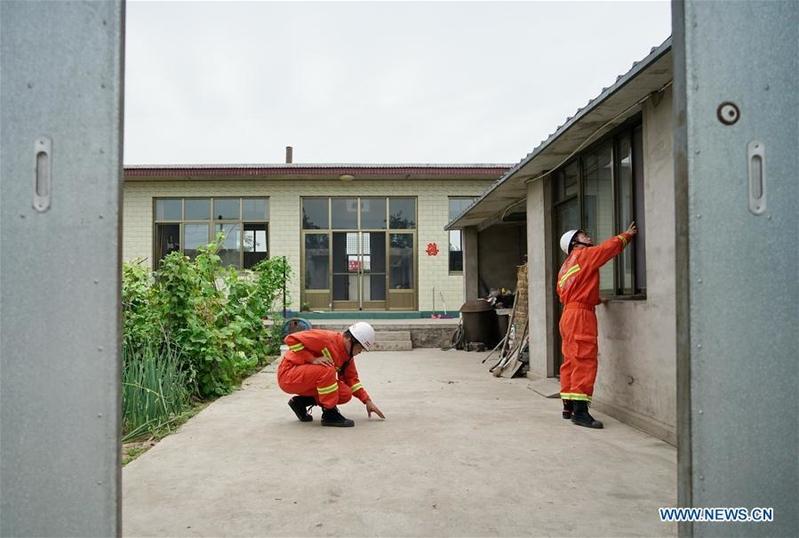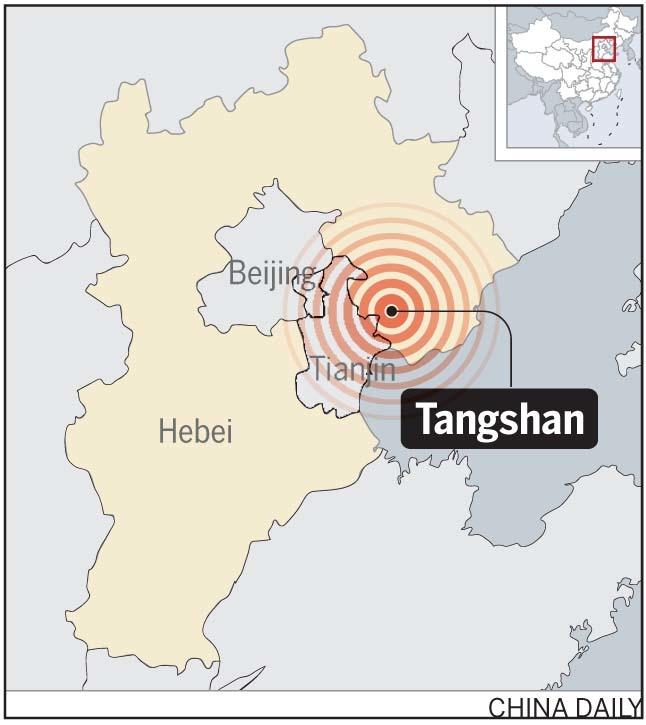 Firefighters check the premises of a household after a 5.1-magnitude earthquake in the Guye district of Tangshan city, north China's Hebei province, July 12, 2020. (MU YU / XINHUA)
Firefighters check the premises of a household after a 5.1-magnitude earthquake in the Guye district of Tangshan city, north China's Hebei province, July 12, 2020. (MU YU / XINHUA)
No casualties or serious damage were reported as of Sunday night after a 5.1 magnitude earthquake hit Tangshan, Hebei province, at 6:38 am, the city's publicity department said.
Rescue teams have conducted a survey in the city's Guye district, the epicenter of the quake, which was also felt by residents in neighboring Beijing and Tianjin.
The quake struck at a depth of 10 kilometers, the Ministry of Emergency Management said. The district is about 170 km southeast of Beijing and around 130 km northeast of Tianjin.
The 5.1 magnitude quake on Sunday was an aftershock of the 1976 one, and another quake of more than 5 magnitude was unlikely to occur in the area in the short term, said Liu Jie, deputy head of the China Earthquake Networks Center
There was no need for residents to be too worried about the quake, the Beijing News reported, citing an expert at the China Earthquake Networks Center.
ALSO READ: 5.1-magnitude quake hits north China, no casualties reported
Tangshan was destroyed by a 7.8 magnitude earthquake in 1976 that killed more than 240,000 people and injured over 160,000.
The 5.1 magnitude quake on Sunday was an aftershock of the 1976 one, and another quake of more than 5 magnitude was unlikely to occur in the area in the short term, Liu Jie, the center's deputy head, told a news conference in Beijing on Sunday afternoon.
He said the epicenter of Sunday's quake was 28 km from the epicenter of the 1976 quake, well within the aftershock zone, and was considered a normal fluctuation.
"The aftershock zone of the 1976 Tangshan earthquake, with a long axis of 140 kilometers, covers some areas in Tianjin and Hebei, but Beijing is not in the zone," Liu added.
According to international research on earthquakes, the slower a seismic structure is formed, the longer the aftershock will last.
"The energy accumulation of Tangshan's earthquake in 1976 took thousands of years, so it's a normal phenomenon that the aftershocks of the quake can last for dozens of years," Liu said. "The frequency and magnitude of aftershocks of earthquakes will decrease with time."
Data from the center show Sunday's quake was the strongest to hit the area within 200 kilometers of its epicenter in the past five years. The area witnessed 17 quakes above magnitude 3 during the period.
A total of 332 aftershocks of more than 4 magnitude have been recorded since 1976, but they have been weak since May 1977.
Since then, only five earthquakes above 5 magnitude have been recorded, including the one on Sunday. The last major aftershock, another 5 magnitude quake, was recorded in Guye in 1995, according to the center.
Following Sunday morning's quake, two aftershocks-one of 2.2 magnitude at 7:02 am and the other of 2 magnitude at 7:26 am-hit the district, Hebei Daily reported.
According to Tangshan's emergency management bureau, no casualties or serious damage were found. There were reports that several old houses in the district had developed some cracks after the quake.

Local residents remained calm, and transportation, communication, and electricity supplies were stable, the bureau added.
Railway authorities halted the operation of trains that were scheduled to pass through the quake zone and conducted a thorough check of railway facilities and equipment, Hebei Daily reported. At around 10 am on Sunday, suspended trains had mostly resumed operation.
"My bed collided with the wall next to it for about 10 seconds, and bottles on my table shook violently, but this was a small earthquake after all," said Zhang Xin, a 20-year-old resident of Fengnan, a district neighboring Guye. She added that nothing serious had occurred.
According to Tangshan's emergency management bureau, no casualties or serious damage were found
Some residents of neighboring cities, including Beijing, Tianjin, and Qinhuangdao in Hebei, said they were awakened by tremors. Yin Yu, who lives in Beijing's Shunyi district, said she felt her bed shaking and started to wonder if it was an earthquake.
READ MORE: Quake network under construction
A warning was sent out by a network jointly established by the Institute of Care-Life, based in Sichuan province, and emergency management organs, Chinanews.com reported.
Residents of neighboring regions, including Beijing and Tianjin, received a warning about 30 seconds before the tremor arrived in those locations via their mobile phones or televisions with earthquake warning functions activated.
The Ministry of Emergency Management has started a level four emergency response for coping with quake disasters, while Hebei's provincial government has started a level three response, with rescue teams and quake experts dispatched to the district.
Wang Dongfeng, Party secretary of Hebei province, ordered a thorough check of damage and losses caused by the quake during a visit to Tangshan on Sunday.
Zou Shuo contributed to this story.
Contact the writers at zhangyu1@chinadaily.com.cn


